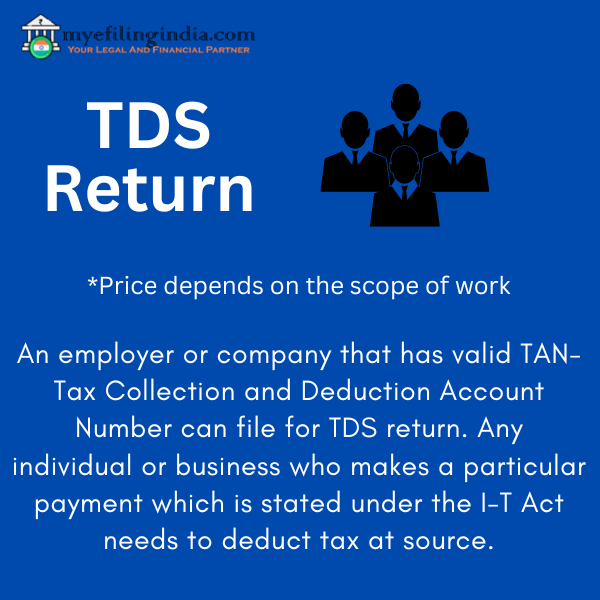Income Tax Return
₹799.00
-
Documents Required for ITR Return File
If you are an employee:
- PAN card
- Form 16 provided by your employer
- Salary slip (**Very essential for e filing of ITR)
If you are a business owner:
- Trading report
- Business account details
- Profit and loss statement if any
Apart from this, you can submit:
- Investment proofs
- Asset purchase/sale documents
- TDS certificates provided by banks
- Interest income statement
- Receipts regarding donations mutual funds and other forms of investments.
Description
e-Filing of Income Tax Return Online in India – An Overview
Every responsible Indian citizen should file income tax to the government. With present technology, you can easily file your income tax online. This process is fast and accurate with no time constraints.
However, Filing income tax return in India through the official website involves filing ITR forms. There is a different ITR form for individuals and ITR form for salaried people. This is a critical task because the income tax department has various forms titled from ITR 1 to ITR 7. Each form has a specific function and belongs to a particular category.
Even if you miss a single field in the form or make any errors your income tax will not be filed on time. This is where you need expert guidance. Vakilsearch files income tax for both individuals and institutions regularly. So you can easily count on us to file your income tax return online. For that, you will have to provide us with the following documents.
Last Date for e-Filing Income Tax Return
The return you are currently completing pertains to your earnings in the financial year 2022-23, which covers the period from 1 April 2022 to 31 March 2023. On the other hand, the assessment year is the year in which you file your returns and disclose your investments for tax assessment related to the respective financial year. Regarding the income earned during FY 2022-23, the assessment year would be the subsequent year, specifically from 1 April 2023 to 31 March 2024. Therefore, the assessment year in this scenario would be referred to as AY 2023-24. The deadline for submitting the ITR for the financial year 2022-23 (assessment year 2023-24) without incurring a late fee is 31 July 2023.
Checklist for Income Tax Return Filing
For Filing income tax return, Section 139 (1) of the Income-tax Act 1961 specifies any individual whose total income during the previous year is more than the maximum amount not chargeable to tax should file their income tax returns online.
Let us make it clear: Any individual earning more than ₹2.5 lakhs, ₹3 lakhs or ₹5 lakhs should file ITR.
Benefits of e-Filing of Income Tax Return
E-filing your income tax return has several advantages that can simplify your financial life. Here’s how it can help you:
1. Avoid Tax Notices: When you e-file, you’re less likely to make mistakes on your tax return that could trigger a notice from tax authorities.
2. Build Financial Records: E-filing encourages you to keep good financial records, making it easier to manage your money.
3. Carry Forward Losses: If you’ve had losses in the past, e-filing allows you to use them to lower your taxes in the future.
4. Get Tax Refunds Faster: E-filing often means you get your tax refund faster, which can be a financial boost.
5. Boost Credit Score: Keeping your tax record clean through e-filing can improve your credit score, making getting loans or credit cards more accessible.
6. Simplify Business Finances: For businesses, e-filing can streamline the tax process, making it easier to meet your tax obligations.
7. Plan Your Finances Better: E-filing makes you assess your financial situation every year, helping you make better financial plans for the future.
Who Should File an Income Tax Return?
According to the Income :
- Salaried individuals with gross income exceeding the exemption level before deductions under Sections 80C to 80U
- Regardless of profit or loss, every firm, whether private limited, LLP, or partnership, is required to file IT return
- Individuals who are Directors in a Private Limited Company or a Partner in a Limited Liability Partnership firm.
- Individuals who earn dividends from mutual funds, bonds, equities, fixed deposits, interest, and other sources
- Individuals that receive income through charity or religious trusts, as well as income from voluntary contributions
- Individuals and businesses seeking tax refunds
- NRIs and tech professionals .
How to File Your Income Tax Return Online
For ITR filing online, first and foremost keep all the soft copies, scanned copies of all the required documents like your bank statement and last year’s return. You should also fill out income tax Form 16.
- itr online apply:Submit all the required documents to our experts
- Step 2: Through the registered portal our experts will file your income tax return online
- Step 3: ITR Filing Form will be selected based on your category, and experts will fill in all required information and claim any applicable exemptions
- Step 4: Our experts will inform you regarding the tax payable amount if any after all exemptions
- Step 5: Subsequently your income tax return will be filed without any hassle.
Note: Make sure to fill in accurate details in every field of the form, and select the applicable ITR Filing Form based on your criteria. If you have any doubts you can reach out to our expert and they will help you out.
You should know that non-compliance with filing of income tax returns can result in huge penalties. So why take that risk, when you can easily get an expert to file your income tax returns online!
How Myefilingindia Can Help You With Income Tax Return Filing?
Filing income tax returns on your own is going to be a tedious task. But if you choose Myefilingindia to file your income tax returns, the whole process can be completed in just three steps. We have an expert team who can provide support around the clock and file your income tax returns online without any delay. Why Do It Yourselves, when our experts can do it for you ASAP
Affordable price: When compared to other competitors we provide the most affordable price to file your income tax return online
| Category | Charges |
|---|---|
| Salaried Employees upto ₹50 Lakhs | ₹999 |
| Salaried Employees More than ₹50 Lakhs | ₹1499 |
Super fast process If you are running low on time or pretty close to the deadline then you should reach out to our experts. We provide the fastest income tax returns filing process in the country
Adept team: Filing income tax returns is one of our daily jobs, our team does it with such ease!
Popular in town: More than thousands of companies choose Myefilingindia for filing their Income tax. Apart from this, we have a large number of individuals who choose Myefilingindia for filing their income tax return online.
All you have to do is reach out to us, sit back, relax, and watch your income tax return filing at super ease.
Income Tax Slab for Senior Citizens Above 60 Years
The income tax slab for senior citizens above 60 years is designed to provide certain concessions and benefits to individuals in this age group. In India, senior citizens enjoy specific tax advantages as recognition of their contribution to society and to alleviate financial burdens during their retirement years. The income tax rates for the senior citizens are presented below:
| Income Tax Slab | Tax Rates for Individual & HUF Below the Age Of 60 Years & NRIs |
|---|---|
| Up to ₹2,50,000* | Nil |
| ₹2,50,001 to ₹5,00,000 | 5% |
| ₹5,00,001 to ₹10,00,000 | 20% |
| Above ₹10,00,000 | 30% |
Penalties for Not Filing an Income Tax Return in India
Late Filing Charges: You will incur late filing fees if you fail to submit your Income Tax Return (ITR) by the due date. The amount of these fees varies based on the filing date. For instance, if you file your ITR after the due date but before 31 December of the relevant assessment year, you’ll be obligated to pay a late fee of ₹5,000. However, if you file after 31 December, the late fee escalates to ₹10,000.
Interest on Outstanding Taxes: In addition to late filing fees, a failure to meet the ITR deadline triggers interest charges on the unpaid tax amount. This interest accrues at a rate of 1% per month or part thereof, beginning from the due date of the return until the date of payment.
Legal Action and Potential Imprisonment: If you neglect to file your ITR despite receiving notices from the income tax department, you could face legal proceedings under section 276CC of the Income Tax Act. If convicted, you may be subject to imprisonment, ranging from a minimum of 3 months to a maximum of 7 years, in addition to fines. It’s worth noting that prosecution is generally reserved for cases involving deliberate tax evasion or repeated non-compliance.
Forfeiture of Deductions: The timely filing of your income tax return is crucial for claiming deductions and exemptions. A delayed ITR filing may result in the loss of these benefits, potentially leading to a higher tax liability and reduced tax savings.
Impact on Credit Rating: The punctuality of your ITR filings can also influence your credit score. Financial institutions and banks consider your credit score when evaluating loan applications. Timely ITR submissions signal responsible tax compliance, enhancing your creditworthiness. Conversely, late or non-filings can lead to a lower credit score, making securing loans at favourable interest rates more challenging.
Form 10BD of the Income Tax Act
Form 10BD is a statement of donations received by a trust, institution, or NGO that is eligible for deduction under Section 80G of the Income Tax Act, 1961. The form must be filed electronically with the Income Tax Department by 31 May of the following financial year in which the donations were received.
The form contains the following information:
- Name and address of the donee
- Permanent Account Number (PAN) of the donee
- Amount of donation received
- Date of receipt of donation
- Mode of payment of a donation
- PAN of the donor, if available
Failure to file Form 10BD can result in a penalty of ₹200 per day of delay, up to a maximum of ₹1 lakh.
Here are the steps on how to file Form 10BD online:
1. Go to the Income Tax Department website.
2. Click on the e-File tab.
3. Click on Form 10BD
4. Log in with your PAN and password.
5. Fill in the details of the donations received.
6. Verify the details carefully.
7. Submit the form.
You can also file Form 10BD offline by sending it to the Income Tax Department by post. However, electronic filing is the preferred method.
What Are Tax Benefits Def(80D, Kind of Types)
Section 80D of the Income Tax Act of 1961 allows a deduction from taxable income for the payment of medical insurance premiums and preventive health checkup expenses. The deduction is available to individuals and Hindu Undivided Families (HUFs).The amount of deduction available under Section 80D is as follows:
For health insurance premiums:
- Up to ₹25,000 for self, spouse, and dependent children.
- Up to ₹50,000 for parents (if they are less than 60 years of age).
- Up to ₹1 lakh for parents (if they are 60 years of age or above).
For preventive health checkup expenses:
- Up to ₹5,000.
The health insurance policy must be a medical policy that covers hospitalisation expenses. The policy must be taken from an LIC or a private insurance company that is authorised to operate in India.
The preventive health checkup must be conducted by a doctor who is registered with the Medical Council of India. The checkup must include at least the following tests:
- Blood pressure test
- Blood sugar test
- Urine test
- Eye test
- ECG
The deduction under Section 80D is available only if the medical insurance policy or the preventive health checkup expenses are actually incurred. The deduction is not available if the policy is taken, but the premiums are not paid or if the checkup is conducted, but the bills are not paid.
The deduction under Section 80D is claimed while filing the income tax return. The deduction is available for the financial year in which the medical insurance premiums are paid, or the preventive health checkup expenses are incurred.
Here is an example of how to calculate the tax benefit under Section 80D:
Suppose Mr X is an individual who pays ₹20,000 for a health insurance policy for himself, his spouse, and dependent children. He also pays ₹2,000 for a preventive health checkup for himself and his family.
The total deduction available to Mr X under Section 80D is ₹(20,000 + 2,000) = ₹22,000.This deduction will reduce Mr. X’s taxable income by ₹22,000, which will lower his tax liability.
Reasons to File an Income Tax Return
There are many reasons why you should file an income tax return, even if you do not owe any tax. Here are some of the most important reasons:
- To claim deductions and exemptions. The government allows certain deductions and exemptions from taxable income. These deductions and exemptions can help you reduce your tax liability. For example, you can claim deductions for medical expenses, education expenses, and home loan interest. You can also claim exemptions for dependents.
- To get a refund. If you have overpaid your taxes, you can claim a refund by filing an income tax return. The refund will be credited to your bank account.
- To build a credit history. Filing an income tax return can help you build a credit history. A credit history is a record of your financial transactions, such as loans and credit card payments. Lenders use credit history to assess your creditworthiness. A good credit history can help you get loans and credit cards at lower interest rates.
- To be eligible for benefits. Some benefits, such as government schemes and scholarships, are only available to people who file income tax returns. For example, the Pradhan Mantri Jan Dhan Yojana (PMJDY) is a government scheme that provides financial services to the poor. To be eligible for this scheme, you must have filed an income tax return in the previous financial year.
- To avoid penalties. If you do not file an income tax return, you may be liable for penalties. The penalties can be steep, so it is important to file your return on time.
Why Should You File Income Tax Return
There are several important reasons why it’s a good idea to submit an income tax return, even if you don’t owe any taxes:
- 1. Claiming Deductions and Exemptions: When you file your income tax return, you have the opportunity to claim deductions and exemptions provided by the government. These can help reduce the amount of income that is subject to taxation. For instance, you can deduct expenses like medical bills, education costs, and the interest paid on a home loan. You can also claim exemptions for any dependents you have.
- 2. Getting a Tax Refund: If you’ve paid more in taxes than you owe, filing a tax return allows you to claim a refund. The excess amount will be credited back to your bank account.
- 3. Building a Credit History: Filing your income tax return contributes to building a credit history. This history is a record of your financial activities, such as loan repayments and credit card bills. Lenders use it to evaluate your creditworthiness. A positive credit history can help you secure loans and credit cards with lower interest rates.
- Accessing Benefits: Some government benefits and programs, such as scholarships and certain schemes like the Pradhan Mantri Jan Dhan Yojana (PMJDY) designed to provide financial services to those in need, may require you to have filed an income tax return in the previous financial year to be eligible.
- 5. Avoiding Penalties: Failing to file your income tax return can result in penalties. These penalties can be quite substantial, so it’s essential to file your return on time to prevent such consequences.
- 6. Fulfilling Civic Duty: Filing your income tax return is not just about personal finance; it’s also a civic duty. It’s your way of contributing to the development of the country. The taxes you pay go towards funding vital government programs, including education, healthcare, and infrastructure, which benefit society as a whole.
Which ITR Form to File?
There are seven different ITR forms available in India, each with its own eligibility criteria and requirements. The ITR form you need to file depends on your income, sources of income, and whether you are a resident or non-resident of India.
Here are the different ITR forms and their eligibility criteria:
- ITR-1 (Sahaj): This form is for individuals with a total income of up to ₹50 lakhs. It is the simplest ITR form and can be filed by anyone who does not have any complex income sources.
- ITR-2: This form is for individuals with a total income of more than ₹50 lakhs. It is more complex than ITR-1 and requires taxpayers to provide more details about their income and deductions.
- ITR-3: This form is for individuals who have income from a business or profession. It is also used by individuals who have capital gains.
- ITR-4: This form is for individuals who are salaried and have opted for the presumptive taxation scheme. This scheme allows taxpayers to pay tax at a flat rate of 5% of their turnover.
- ITR-5: This form is for Hindu Undivided Families (HUFs). It is similar to ITR-1, but it also requires HUFs to provide details of their members.
- ITR-6: This form is for companies. It is the most complex ITR form and requires companies to provide detailed information about their income, expenses, and taxes.
- ITR-7: This form is for individuals who are non-residents of India. It is similar to ITR-1, but it also requires non-residents to provide details of their foreign income.
If you are not sure which ITR form to file, you can always consult with a tax advisor.
Here are some additional things to keep in mind when choosing an ITR form:
- The ITR form you choose must be the correct one for your income and sources of income.
- You must provide all the required information in the ITR form.
- You must sign and date the ITR form.
- You must submit the ITR form by the due date.
The due date for filing income tax returns for the financial year 2022-23 is 31 July 2023. However, there are some exceptions to this deadline. For example, senior citizens and persons with disabilities have a longer deadline to file their returns.
How to File ITR for FY 2022-23
1. Contact Myefilingindia Expert
2. Submit Your Data for the Filing Process
3. Get Receipt of Acknowledgment
Penalty for Late Filing of ITR
The penalty for late filing of ITR depends on the taxpayer’s total income and whether they have any outstanding tax liability.
- For individuals with a total income of less than ₹5 lakh, the penalty for late filing of ITR is ₹1,000.
- For individuals with a total income of ₹5 lakh or more, the penalty for late filing of ITR is ₹5,000.
If the taxpayer has any outstanding tax liability, they will also be liable to pay interest on the outstanding tax amount. The interest rate is 1% per month or part of a month, from the due date of filing the ITR till the date of payment of the tax.
In addition to the penalty and interest, the taxpayer may also be liable to face prosecution for late filing of ITR.
Here are some things to keep in mind to avoid penalties for late filing of ITR:
- File your ITR on time. The due date for filing ITR for the financial year 2022-23 is 31 July 2023.
- If you are unable to file your ITR on time, you can apply for an extension of time. The maximum extension that can be granted is three months.
- If you have any outstanding tax liability, pay it as soon as possible.
- Keep all the documents related to your income and expenses safe. You may need these documents to file your ITR.
Why Myefilingindia?
- Just share your bank statement and cash transaction details and we’ll create the financial statements. In two working days, you’ll get your ITR Filing
- We make your interaction with the government as smooth as is possible by doing all the paperwork for you. We will also give you absolute clarity on the process to set realistic expectations.
- Our team of experienced business advisors are a phone call away, should you have any queries about the process. But we’ll try to ensure that your doubts are cleared before they even arise.
Recent Updates
During the current fiscal year, 2022–2023, the Central Board of Direct Taxes (CBDT) has announced the ITR forms ITR-1 to ITR-6 (AY 2023-24). The government announced the ITR-7 form on February 14, 2023. ITR forms haven’t undergone any significant changes. The ITR forms have, however, been announced over two months earlier than usual.








Reviews
There are no reviews yet.